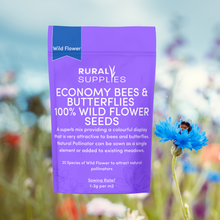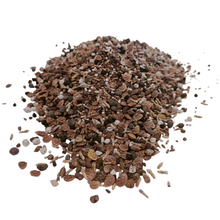Transform your garden into a vibrant oasis for bees and butterflies with our specially curated nectar-rich wildflower mix. Designed to attract a wide range of pollinators, this blend includes both annual and perennial wildflowers, making it perfect for creating a pollinator-friendly wildflower mix that will flourish year after year.
Crafted to provide a year-round source of nectar and pollen, this wildflower mix for bees and butterflies includes plants for pollinators like cornflower, poppy, and sainfoin, as well as other nectar-rich plants for bees. Whether you’re looking to create a wildflower meadow for pollinators or a small patch in your backyard, this bee-friendly wildflower mix is perfect for supporting biodiversity and attracting essential wildlife to your garden.
Ideal for UK gardens, this mix contains a wide selection of flowers known for attracting bumblebees, red admiral butterflies, and other beneficial insects. With 20 species of wildflowers, including favourites like yellow blossom clover for bees and chicory for butterflies, this mix offers variety and vibrancy.
Contains: 20 species of 100% Wildflower
- Cornflower
- Poppy
- Sainfoin
- Yellow Blossom Clover
- Chicory
- Burnet
- Bird's Foot Trefoil
- Phacelia
- Borage
- Gold of Pleasure
- Ribwort Plantain
- Vetch
- Alsike Clover
- Common Mallow
- Corncockle
- Black Medick
- Dropwort
- Ribwort Plantain
- Phacelia
Sowing Rate: 1–2 grams per square metre
Packet Contents: 100% Wildflower Seeds
Key Benefits:
- Designed specifically to attract bees and butterflies with nectar-rich flowers.
- Includes a diverse mix of annual and perennial wildflowers, ensuring year-round blooms.
- Perfect for creating a pollinator-friendly wildflower mix that supports biodiversity in your garden.
- A sustainable way to create a bee-friendly garden, perfect for small or large spaces.
- Features wildflower seed varieties for bees like cornflower for pollinators and phacelia for bees and butterflies.
- Wildflower mix with clover provides essential nutrients for pollinators, especially in early spring.
Sowing Guide:
- Prepare a sunny, well-drained area to ensure the best results for these wildflowers for sunny spots.
- Scatter seeds at a rate of 1–2 grams per square metre and lightly rake over.
- Water gently to keep soil moist until germination, and watch as your garden flourishes with vibrant, pollinator-attracting flowers!
This wildflower mix for bees and butterflies is perfect for anyone wanting to contribute to the health of our planet's pollinators. Whether you’re planting in a wildflower meadow for biodiversity or creating a smaller space to support local wildlife, this mix is an excellent choice. Plus, with our wide selection of wildflowers for a buzzing garden, you can enjoy a diverse and beautiful landscape, knowing you’re helping the environment.
Order your nectar-rich wildflower seeds today and create a garden that’s as good for the planet as it is beautiful!




